15 Tips for Providing a Positive Candidate Experience
How to provide a positive candidate experience that boosts your employer brand, appeals to top-notch talent, and strengthens your recruiting pipeline.
5.0

Add an AI assistant to your interviews
Start with 5 interviews for free
Already have an account?
Log in
Job candidates aren't customers. But thinking of them as such is a helpful thought exercise for recruiters and hiring managers keen on finding the best talent and promoting job openings.
So how would you treat a job seeker if they were a customer? You'd be enthusiastic about your product, sure. But also forthcoming about what it is and how it works. You'd give your spiel, but also be respectful of your candidate's time. You'd let the candidate ask questions, answer them honestly, and communicate any updates quickly.
If that's not quite how your hiring practices currently operate, you may want to take a closer look at your candidate experience. If you want to know why providing a positive one is well worth the effort, and then learn some tricks for how to improve it, we've got you covered.
Why is the candidate experience important?
The candidate experience encompasses all the interactions, impressions, behaviors, and feelings job seekers have toward a company during their hunt for employment. It ebbs through every step of the candidate journey for actions big and small: anything from a job seeker stumbling upon a LinkedIn post from a recruiter, to reading a Glassdoor review, to interviewing with a hiring manager during late stages of an application.
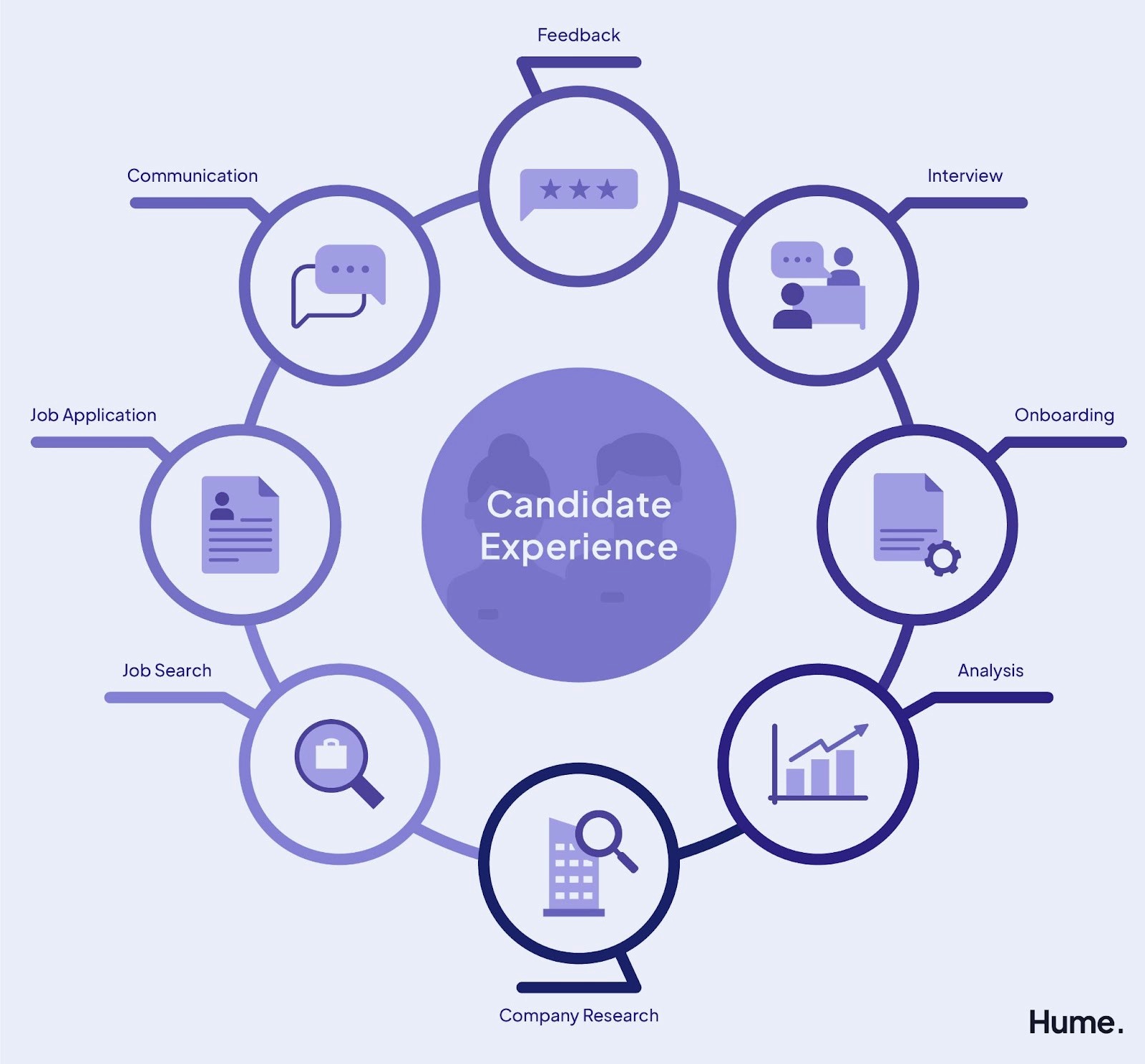
Since it touches so many facets of your company, the candidate experience is vital for attracting top talent and boosting your employer brand. And a negative one can haunt you: 58% of candidates say they've declined an offer because of a poor candidate experience (up from 50% before the COVID-19 pandemic).
Benefits of a positive candidate experience
A positive candidate experience, on the other hand, can help your company flourish. In fact, 80% of job seekers said it played a role in their decision to accept an offer.

Here are some other perks:
Appeal to top talent. Amid countless opportunities, it's tough to maintain your best candidates' attention. But a positive experience — where hirers are communicative, transparent, and helpful — signals that your company would be pretty great to work for.
Boost ROI. Improving the candidate experience means streamlining your recruitment strategy. Which, in turn, means you'll get more out of all the resources you invest into hiring. After all, the more high-quality candidates you get in for an interview, the likelier you are to make a high-quality hire, which yields a goldmine of performance gains down the road.
Bolster employer brand. How candidates perceive your company matters! Word of mouth spreads quickly: 72% of job seekers who had a bad experience told people about it, while 61% of candidates said they've left positive reviews after positive experiences. If you want a candidate's friend's cousin's wife — who may be the exact right fit for your role — to think highly enough of your company to apply, you need to think about how your reputation trickles throughout her entire network.
Improved application completion rate. A positive candidate experience ensures both passive and active candidates follow through on completing applications and scheduling interviews, instead of losing interest somewhere along the way.
Better pipeline for tomorrow's hiring decisions. You may have dozens of stellar candidates gunning for a single job. If you enhance their experience — making them feel valued, respected, and understood throughout the application process — they may be a perfect fit for a future role that opens up, even if they don't get the offer they're currently vying for.
Keep in mind that the benefits pay dividends even after talent gets hired. If you improve the candidate experience, you're likely to see better long term retention, a stronger workplace culture, and more employee engagement.
15 ways to provide a positive candidate experience
If you're looking to improve the candidate experience, heed thy golden rule. Put yourself in the candidate's shoes. How would you like recruiters to treat you as a potential hire? You'd likely gravitate towards hiring practices that are honest, communicative, and respectful.
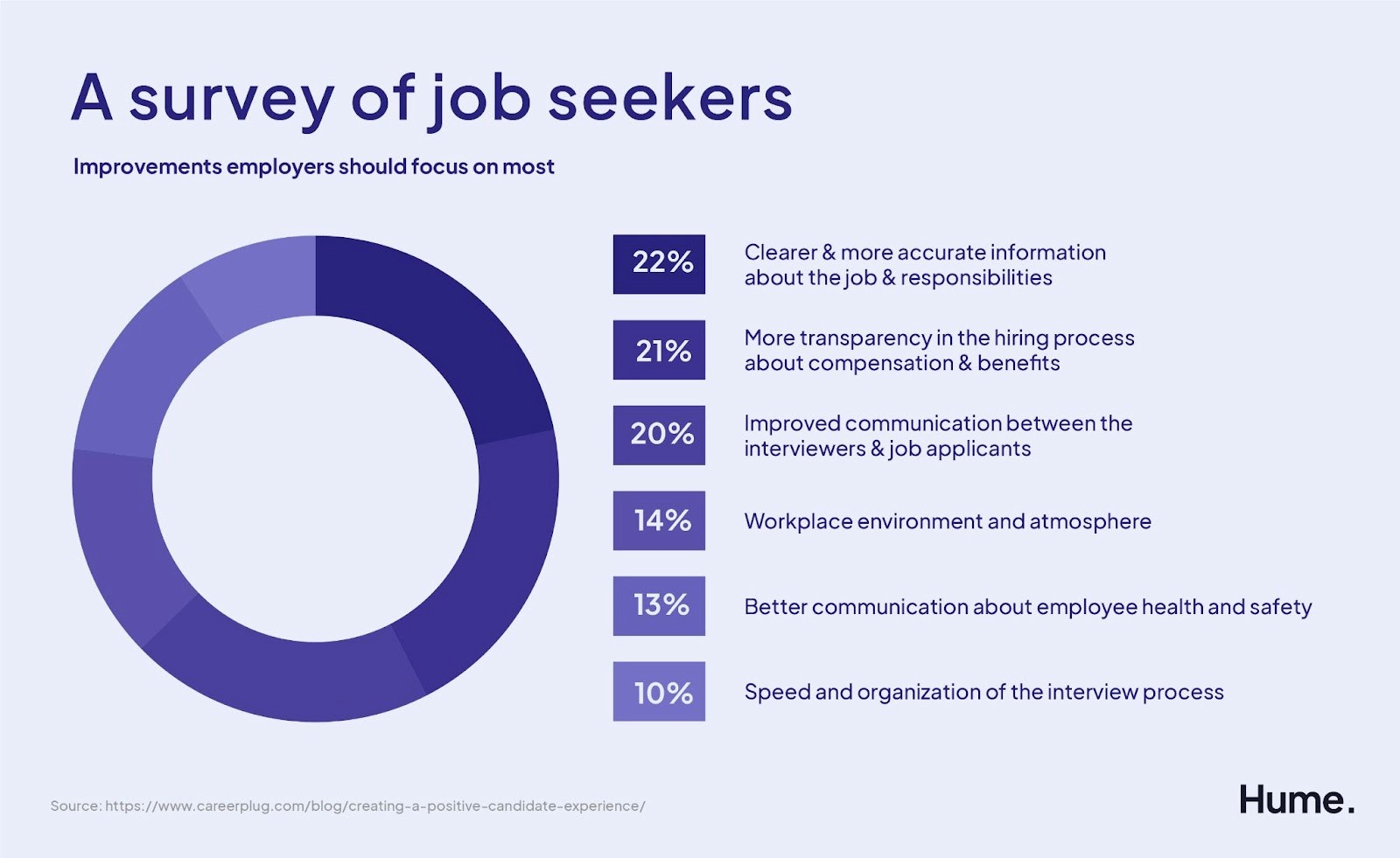
But how do you ensure those lofty ideals become a reality for every job seeker? Here are some tried-and-true tricks to providing a great candidate experience for all.
Be an open book about the job
Good recruiters are good marketers. You want to play up your job opening and company. But the last thing you want to do is stretch the truth about what day-to-day work and office culture is actually like. Or conceal aspects of the job that are unappealing.
So if a candidate asks a question, answer it as honestly as you can. Even if it's about a conventionally "taboo" topic, as 21% of candidates desire more transparency throughout the hiring process about compensation and benefits. During the interview stages, this means taking time to let the job seeker ask questions. But you should also strive to be upfront about everything a job entails even before a candidate applies.
Look at every stage of the candidate journey
The candidate journey is nonlinear, and job seekers employ multiple channels (online and through their personal networks) to learn more about your company.
Because of this, an HR leader named David Bernstein told Forbes that he likes to think of a candidate's experience as, "the sum of all the 'micro experiences' they go through from beginning to end. You can't expect a candidate to have a favorable experience because you addressed one part of the overall journey. Walk in the shoes of your passive and active candidates from beginning to end and then see how you would feel."
That's why it's crucial not to look at each stage of the application process in a vacuum. Maybe you ensured an easy-to-submit application and processed it quickly. But if the interview was unstructured and confusing, it's unlikely a job seeker will come out of it feeling great about your company.
Whether a potential candidate is first discovering your role online or a new hire is in the middle of onboarding, you want their experience to be as seamless as possible.
Refine your job description
The job description is a crucial candidate touchpoint, but it can be tricky to write. You always want to make sure you're defining the job and the skills required to fulfill its responsibilities, instead of asking for personality traits that have little to do with performance. You should also strive to rid your post of gendered wording, which can open you up to hiring bias.
Tons of companies still omit salary ranges in their job posting, but you stand out if you include it, especially since 39% of candidates expect to see info about compensation.
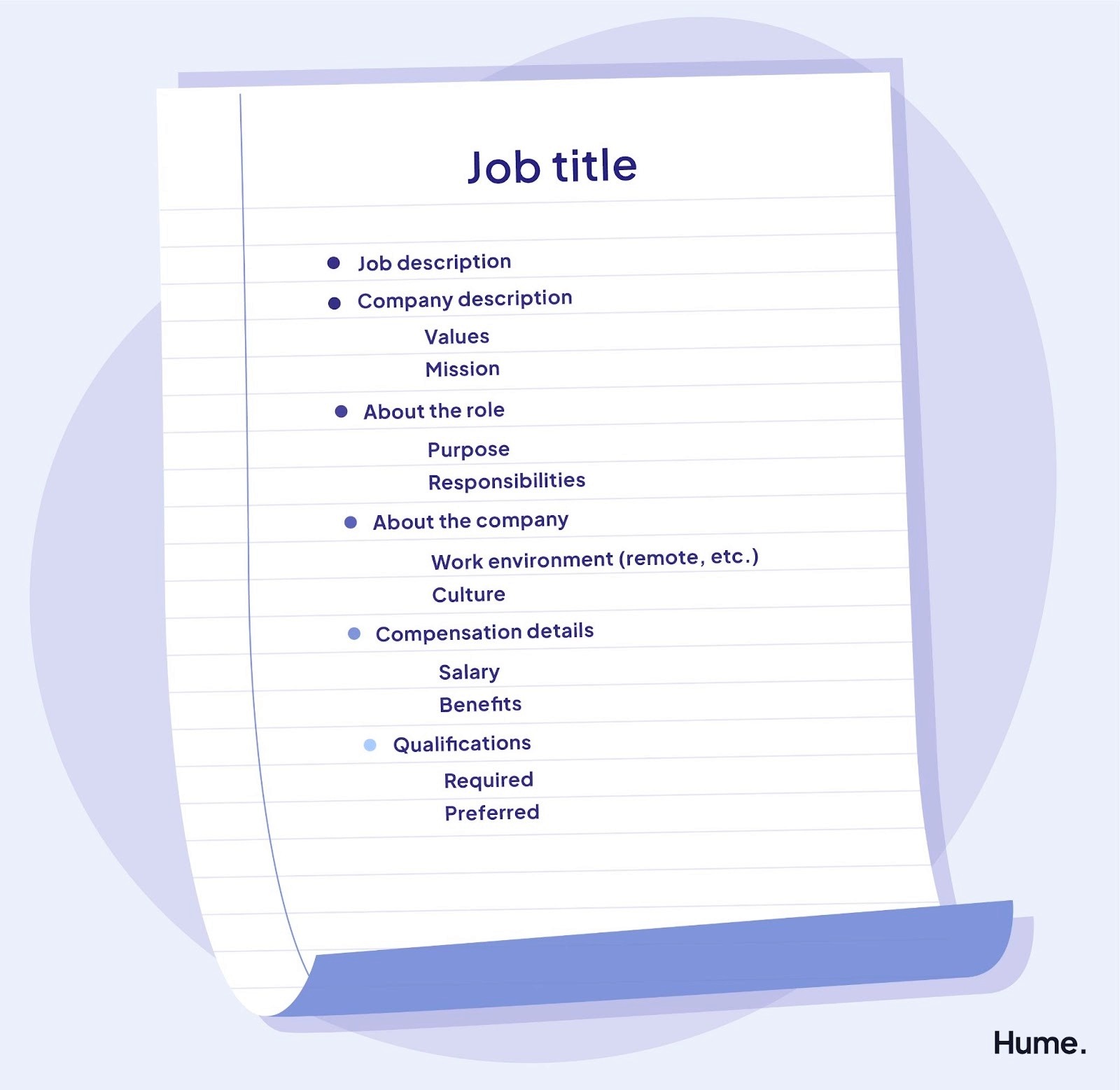
Job descriptions work best when you're giving candidates an overview of your company values and culture. You also open up your hiring pool when you're less rigid about academic requirements and years of experience, so consider separating out required qualifications from preferred ones.
Make it easy for candidates to apply
We're all busy. Sometimes a positive candidate experience just comes down to designing an application that's quick to finish, with minimal hoops to jump through. Since 82% of candidates look at jobs on their smartphone, making your application mobile-friendly is a good start. You should also consider making sure your careers site is easily accessible. It's also helpful to recruit broadly, broadcasting your application across multiple social media and job search channels.
Communicate all updates quickly
Candidates may ask for an update on their application status before you're ready to give one. If you don't have an immediate answer for them, let them know what the hold up is. It's not always easy to process applications quickly. But if you relay updates as soon as they're available, job seekers will feel more comfortable living in the unknown of a pending application.
Share quick bios of the interviewers ahead of time
The best candidates do their homework, and it's jarring to go into an interview without a good read on who exactly you're speaking with.
If you want a quick and easy way to bolster an interviewee's experience, shoot them a quick blurb of all the interviewers before the conversation. It establishes enough familiarity to put candidates more at ease, and also gives them a chance to browse LinkedIn profiles.
Create a candidate feedback loop
If you're unsure how to quantify or improve the candidate experience, why not touch base with the candidates themselves?
Job seekers always have thoughts about how they've been treated throughout the different stages of the hiring process. So consider shooting out quick, optional surveys to both accepted and rejected applicants at each stage, asking how satisfied they are and if there's anything they wished your company did differently.
You won't get every job seeker to fill out every survey. But any information you get in return is valuable insight, straight from the source, on how you can make your candidates' lives easier.
Of course, feedback goes both ways. Sometimes rejected candidates want to know why they missed the mark or how they can improve for their next job application. If a candidate you interviewed but ultimately turned down shoots an email asking for feedback, an honest and respectful message in return often bolsters their experience. It also helps them stomach their disappointment. If you can get specific about what you liked about their application and where they missed the mark, trust us, they'll appreciate it.
Show, don't tell
Candidates want to know what it's actually like to work at your company. With that in mind, it helps to introduce job seekers you're interviewing to colleagues they'd be working with on the job, urging them to ask questions about day-to-day office life. If the position is in-person, give them a tour of the office and let them envision their potential work environment.
Candidates also want to know about your company's culture and values. During the interview, make sure you're touching on how your culture impacts the job. Cultural fit is an often overlooked trait that separates great candidates from good ones, and it helps to know when job seekers are aligned with your values.
Make your interviewees feel valued
Interviewing is a two-way street, and candidates take careful stock of how recruiters treat them. That's why it's crucial to ensure every interviewee feels heard. There's a practical reason for this: you're always one bad interview away from a negative Glassdoor review.
But treating every interviewee with respect and hearing them out is also just… the right thing to do. According to a recent survey from JDP, 93% of job candidates have experienced anxiety due to an interview. Respondents were more nervous about a job interview than a first date!
A good candidate experience means making interviewees feel comfortable. Maybe tell them a little more about your company and the job they're interviewing for before you get into questions. And let them know why you liked their application enough to interview them. Any courtesy you extend goes a long way.
Try not to ghost
According to a recent survey of 1,500 candidates, 75% of job seekers never heard back from an employer after an interview. Needless to say, that's a lousy candidate experience.
It's hard to get back to everyone, especially if you're sifting through a huge talent pool. But while candidates don't expect to earn every job they apply for, they do expect to hear back from you if and when you hire someone else.
For a better candidate experience, you should also consider sending follow-up messages to job seekers you interviewed but didn't offer a job to, and maybe even give them a referral to a different department. They'll appreciate the gesture, and they may be a great fit for a future role.
Use a candidate decision matrix
Applications can bleed into one another after a while. And the larger your talent pool, the harder it becomes to differentiate between candidates. If you use a weighted rubric that scores candidates across different traits — otherwise known as a candidate decision matrix — you'll likely land upon the best match between company and job seeker.
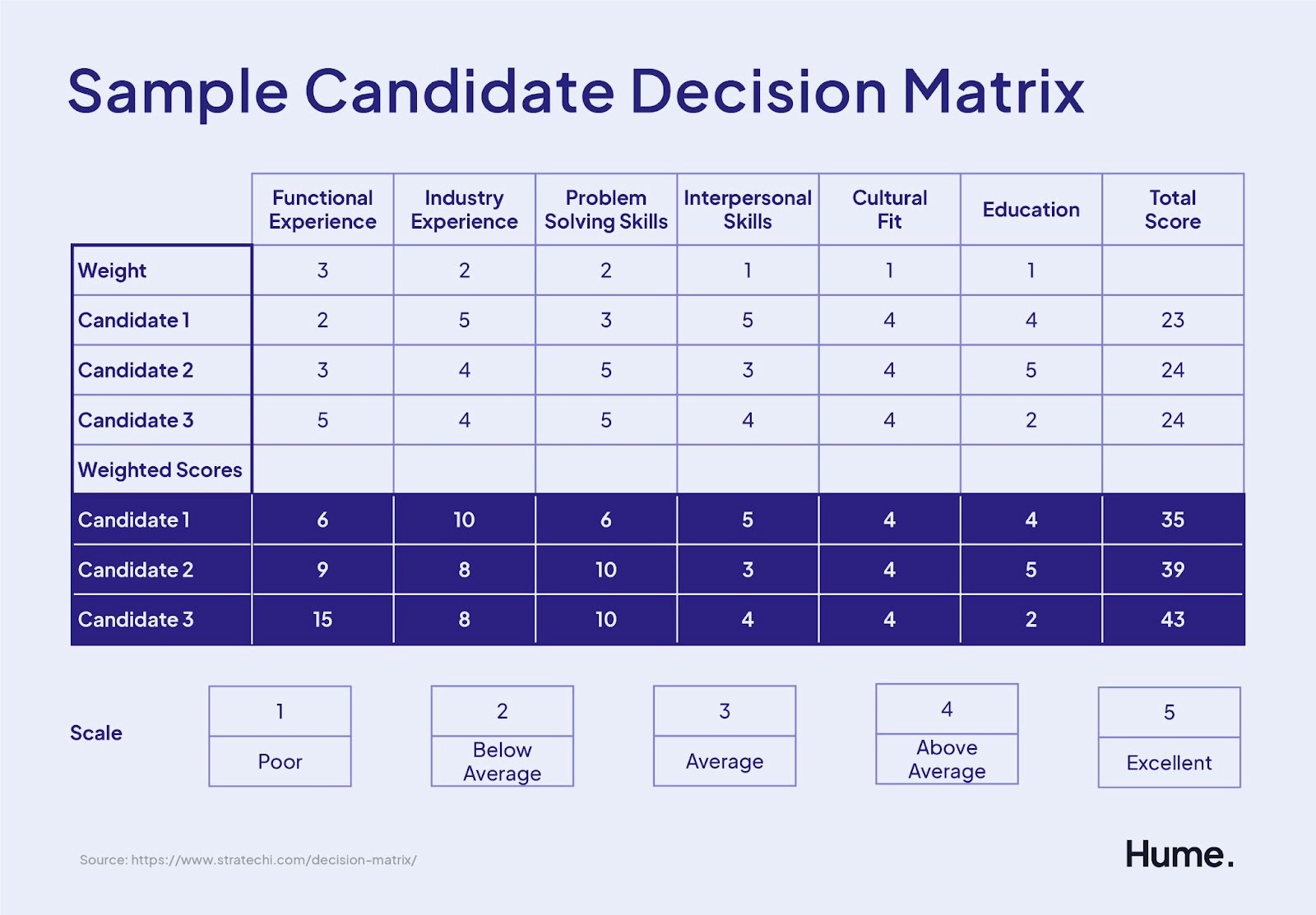
How does this foster a positive candidate experience? You're looking at job seekers as individuals instead of cogs in a corporate machine, assessing their applications holistically to arrive at a decision that benefits them just as much as it does you.
Be honest about your company culture
It's one thing to tell candidates what they want to hear. It's another thing to explain what your company stands for and how it goes about its business. When you have a firm company culture, you won't appeal to everyone, and candidates want to know whether they'll be a good fit before signing an offer letter.
To showcase company culture as a part of the candidate experience, talk about it in your website's careers page. Recruiters should also be trained to speak on it in every hiring conversation.
Discuss health and safety policies
The COVID-19 pandemic turned the job market upside-down and remains a serious consideration for candidates weighing other job offers. Job seekers want to know what your exact health and safety protocols are, and whether you'll live up to them in practice.
So, if you're hiring for an in-person role, take a moment in the interview to discuss the steps you'll take if an employee tests positive for COVID.
Even with remote positions, it can help to have clear-cut answers for how your company nurtures both physical and psychological safety in the workplace. Candidates want to feel taken care of if anything ever goes awry.
Respect candidates' time
Candidates take an average of seven hours researching companies to prepare for an interview. They also spend hours crafting cover letters, tweaking resumes, reaching out to recruiters for questions, etc…
Recruiters and hiring managers should never make candidates feel like any of that time has been wasted. So try to communicate updates and be available for any questions any member of your talent pool asks along their hiring journey.
Process applications quickly
The job search can be stressful, especially when it's dragged out and employers take forever to assess applications. Try to screen resumes ASAP and communicate updates as soon as you make a decision, whether you're rejecting a candidate or ushering them further along in your process.
Since candidates apply to multiple positions at around the same time, they want quick notice to weigh their options. While 37% of job seekers hear back about a job within one week, you'll look better if you can go even quicker. Regardless of the result you're communicating, candidates appreciate a prompt response to their inquiries. It signals that you've actually looked at their application and helps them modify their job search.
It also helps to give candidates a timetable for when they can expect decisions. Just be confident you can hit that self-imposed deadline. If you're dealing with a high volume of candidates, consider employing an applicant tracking system.
And remember: since top talent is off the market within ten days, a fast process will benefit your company just as much as the candidate.
Bolstering the candidate experience with a fair and consistent interview process
We've talked a lot about interviews in this guide.
They're often the most important component of any job application. And since they allow job seekers to interact with a company's current employees and gauge their fit, they're essential to the candidate experience.
But a lot of current interview practices aren't up to the task. After all, 83% of surveyed job seekers said a lousy interview experience causes them to change their mind about a job opening they used to like.
So how do you avoid the pitfalls of a bad interview? Your process needs to be fair. And organized. You also need buy-in across your recruiting teams, and a way to corral all the data from interviews without breaking concentration from the candidate you're speaking with.
To fix a broken interview process, we created Hume, a talent intelligence platform that transcribes and summarizes conversations with candidates to easily annotate and share with your colleagues.
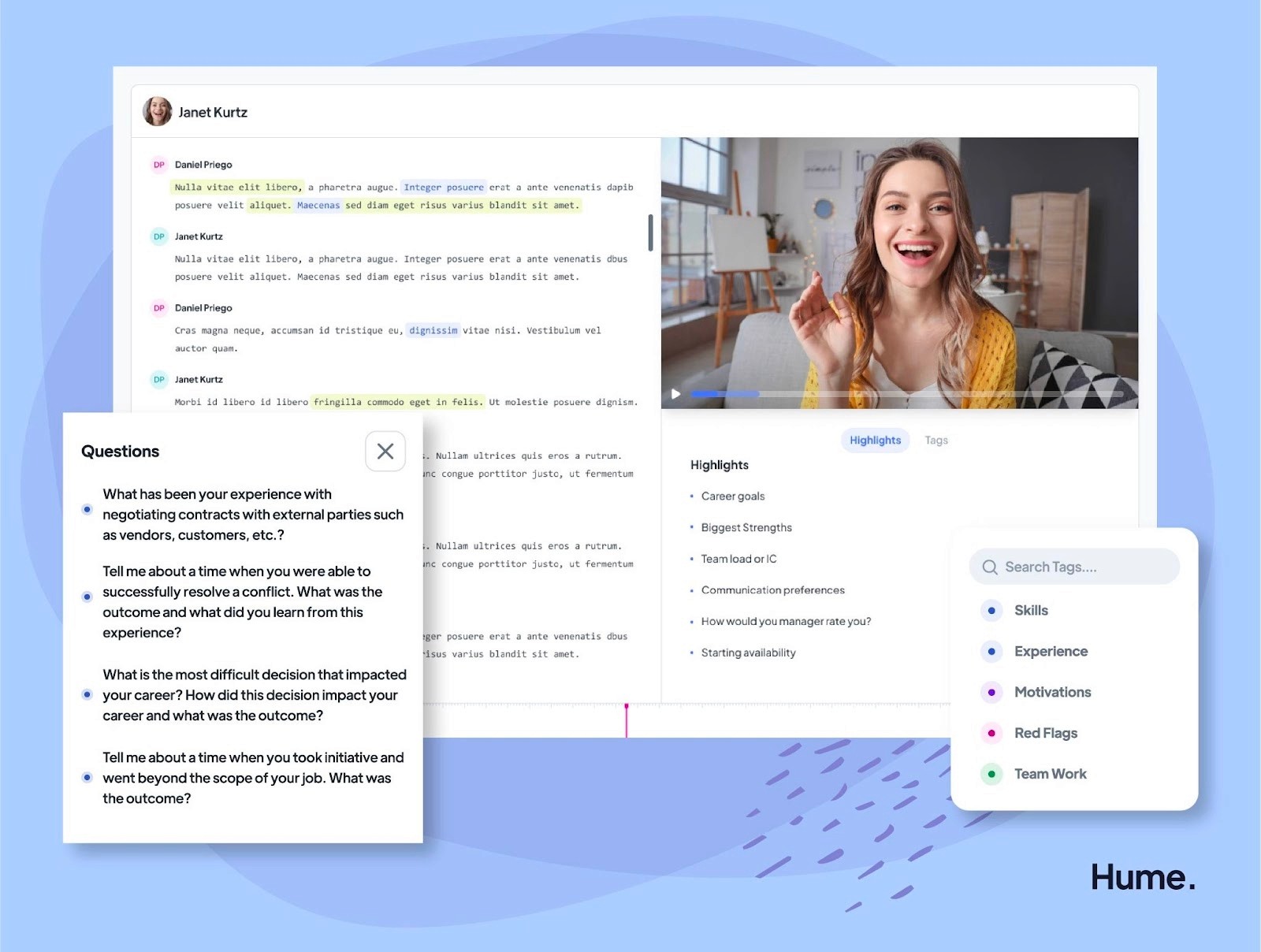
With Hume, all your attention stays with the candidate. You won't need to focus on scribbling notes, or worry about missing an important piece of information. Our interview companion uses artificial intelligence to record and transcribe the entire conversation. It also extracts all the interview questions you ask out of the transcript so you can easily revisit relevant passages. You can even tag sections according to a candidates' skills, motivations, experiences, and whatever other metric you want to use to make an informed hiring decision.
Hume also lets you "highlight" parts of the interview to create a video snippet that you can share with your hiring team members to get extra input, which reduces interview bias and keeps your company on the same page.
And if you want to ensure every interviewer is equipped to deliver the most positive candidate experience possible, you can even create a coaching library with the platform's playlists feature. This way, your company can teach every hirer on your team about how to make job seekers feel respected and valued.
Not only will Hume help you find the best candidate. It'll also ensure candidates themselves walk away from interviews feeling uplifted and informed — regardless of whether the job is the perfect fit. You'll boost your employer brand, all while reducing time to hire.
Ready to see how to ensure a stellar experience for every interviewee? Sign up for our waiting list on our home page for early access to our tool. You can also shoot us a follow on LinkedIn to learn more about how we're paving the way for fairer, better interviews.
Imagine transforming every interview into a strategic advantage. Dive deep into every conversation, free from the distraction of note-taking. This isn't just wishful thinking – with Aspect, it's how you'll redefine your hiring process.
Beatriz F
People Success Specialist
Absolutely game-changing for busy recruiters!
The summary, the Q&A feature and the ATS integration have boosted my productivity and lowered the context-switching stress, the analytics provided allowed for me and my team to have full visibility over our stats, and Aspect's team couldn't be more helpful, friendly and accessible!
More Content On Talent Acquisition

